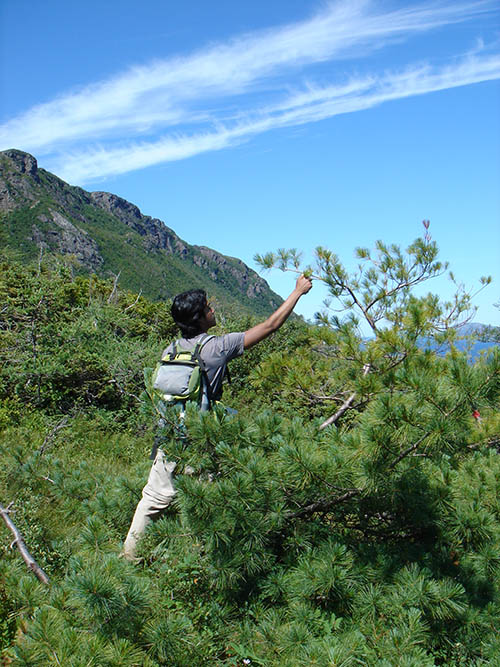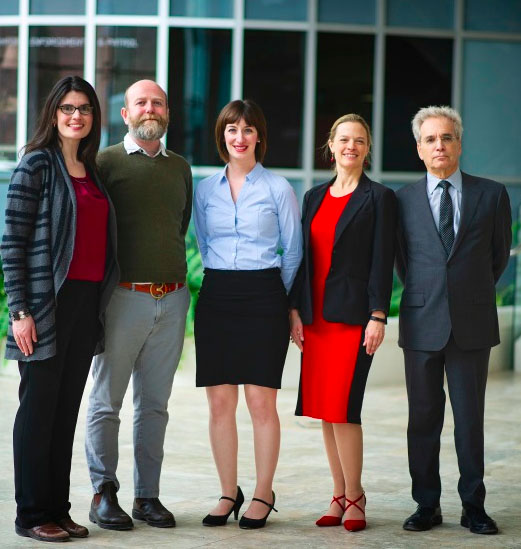Research Report: 2016-2018
▼ Choose a report:

Powered by Research & Graduate Studies

Powered by Arts and Social Science

Powered by Fine Arts

Powered by Science and the Environment


MSc student Victor Valdez takes field samples for eastern white pine ecology research. Photo credit Dmitry Sveshnikov
Forestry and the bioeconomy is an exciting area of research for our campus, region and province. The Research Office supports this agenda through activities such as the Forestry Research Connector, an event held by the office and the Canadian Forest Service (CFS) in December 2018. This event highlighted current research and potential opportunities for collaborative work in forestry-related topics. One such collaborative project is ACCESS – Assessing Climate Change in Ecological and Socioeconomic Systems, led by CFS-Corner Brook’s Dr. Joe Bowden (adjunct professor) and Doug Piercey. Another is eastern white pine ecology research being undertaken by Drs. Dmitry Sveshnikov and André Arsenault (CFS and adjunct professor). Dr. Arsenault also leads a NRCAN research initiative on boreal sentinels and a forest biodiversity early warning system with cyanobacterial lichens with several collaborators, including Dr. Michele Piercey-Normore, the Miawpukek First Nation, Parks Canada and the Norwegian University of Life Sciences. In addition to the collaborative research program being undertaken with Corner Brook Pulp and Paper Ltd., with funding received from the Workforce Innovation Centre and in conjunction with NL Forestry Industry Association, Dr. Stephen Decker is leading a team to examine how to effectively develop and promote the potential of the bioeconomy in the forest sector to underrepresented groups.

From left, Dr. Veronica Hutchings, director, ARC-NL: Dr. Ben Zendel, Canada Research Chair, (aging and auditory neuroscience): Dr. Karen Doody, ARC-NL project coordinator; Dr. Kelly Vodden, AVP Research and Graduate Studies, Grenfell Campus; and Dr. Stephen Bornstein, director, NL Centre for Applied Health Research.
Food and agriculture represents another area of research strength at Grenfell Campus. A number of agricultural initiatives were initiated over the 2016-18 period with government and industry partners, including roundtable discussions held on campus to identify over-arching research priorities in food and agriculture. The Grenfell Food and Agricultural Initiatives Working Group worked with other partners to establish a province-wide “Team Agriculture,” along with the Department of Fisheries and Land Resources, Agriculture and Agri-Food Canada, the Newfoundland and Labrador Federation of Agriculture and Food First NL. Another collaborative effort among these partners is the biennial agriculture "Our Food, Our Future" research symposium.
Grenfell’s Boreal Ecosystem and Agriculture Sciences Facility (BERI), the Functional Foods Sensory Laboratory and Environmental Policy Institute are key assets that drive our food and agriculture research efforts. With support of provincial and federal funding partners and led by Dr. Raymond Thomas, the Functional Foods lab examines "functional foods" – natural or processed food products with known health benefits beyond basic nutritional needs and continues to grow its research activity, outputs and partnerships. Also within the food and agriculture sector we have been working on a number of agricultural initiatives with government and industry partners. For example, our BERI researchers have been working with New World Dairy to evaluate the use of dairy digestate, a result of anaerobic digestion of dairy farm waste, for the production of vegetable under controlled (greenhouse) conditions.
The province’s Aging Research Centre (ARC-NL), was established in 2018. It is supported by a provincial government investment of over $200,000, and brings together researchers to facilitate partnerships and catalyze new research initiatives, policies and programs in the area of aging in the province and in small-town, rural and remote communities. This included the launch of the ARC-NL Research Grants and Graduate Fellowships funding program. The Centre is led by Director Dr. Veronica Hutchings, in conjunction with other members of the ARC-NL core leadership team, a management board chaired by Grenfell VP Dr. Jeff Keshen and a multi-stakeholder advisory committee.
The Offices of Research and Graduate Studies and Engagement also actively participate in The Way Forward priorities to grow NL agriculture, forestry and renewable energy sectors. In addition, our offices are currently involved in two provincial Regional Innovation Systems (RIS) Pilots designed to enhance innovation and competitiveness at the regional level: forestry and agriculture RIS pilot In Corner Brook and tourism and fishery pilots on the Northern Peninsula and in Southern Labrador.
Grenfell campus is committed to working with and as part of the community of Corner Brook and the western region, located within traditional Mi'kmaw territory. In alignment with this commitment, Grenfell Campus is taking a leading role in Memorial’s efforts to strengthen Indigenous research. In partnership with Grenfell’s Indigenous Resource Centre and the Grenfell Office of Engagement, the Office of Research and Graduate Studies is working to promote and support meaningful and appropriate research collaborations with Indigenous groups in the western region and with Innu, Inuit and Mi’kmaw communities and organizations throughout the province.
For instance, an experiential learning student research project with a Business 1020 entrepreneurship class was completed in 2017 in partnership with No’kmaq Village (Flat Bay Band). Students developed models for sustainable tourism that celebrate Indigenous heritage while also providing a potential source of revenue. Meanwhile, Master of Arts in environment policy (MAEP) students also undertook on projects in collaboration with the community, including examining strategies for addressing water insecurity (Ayotunde Omosule) and traditional knowledge and land use (Brady Reid).
Other projects included the 2018 symposium Etuaptmunk: Two-Eyed Seeing in Campus/ Community Collaboration. Organized in partnership with Qalipu First Nation the symposium addressed the potential for collaboration in areas of Health and Wellness, Education, Natural Resources and the Environment, and Entrepreneurship and Innovation. Also in 2018, Dr. Svetlana Barkanova led a successful NSERC PromoScience application to develop a scientific and cultural outreach program for youth, particularly girls and Indigenous students, in rural areas of western Newfoundland in partnership with Qalipu First Nation and Parks Canada. Our Grenfell Art Gallery also regularly features work by Indigenous students, faculty, alumni and visiting artists. In 2018, an artist panel discussed their diverse practices in relation to the transmission and revitalization of Indigenous stories and experiences. The panel launched Visiting, an exhibition by MacDonald curated by alumna Emily Critch reflects and unpacks Indigenous/settler identity, pan-Indigenous cross-cultural exchange, cultural revival, and queerness.
In Labrador, research on the harvesting of rainwater, led by Dr. Maura Hanrahan, was conducted in partnership with NunatuKavut Community Council and Black Tickle Local Service District, along with another to examine the cultural and historical significance of the Labrador Husky in partnership with the Labrador Husky Committee, Northern Lights Dog Sledding, and NunatuKavut Community Council. MAEP student Jason Dicker examined the implications of the George River Caribou hunting ban in collaboration with the Nunatsiavut Government and Research Ethics Board member Dr. Stephen Decker participated in an Indigenous research governance dialogue and knowledge sharing event hosted by the NunatuKavut Community Council and Southern Inuit of NunatuKavut. Grenfell Art Gallery celebrated the presence of our students and alumni in the "North West River AiR: Six Years of the North West River Residency" exhibit in June 2018. We look forward to continuing efforts such as these to support respectful and reciprocal academic and research partnerships with Indigenous peoples.
Grenfell Campus is also committed to developing research partnerships with communities and regions throughout Newfoundland and Labrador. For example, Grenfell, in partnership with the Harris Centre, is co-leading the regionally-based Sustainable Northern Coastal Communities (tip of the Northern Peninsula) and the Thriving Regions Partnership (Southwest Coast and Baie Verte) initiatives. The School of Fine Arts regularly contributes to the cultural vibrancy of our city through creative and scholarly activities such as theatre productions, exhibitions, the Corner Brook Museum Artist-in-Residence program and festivals such as CBNuit and the Saltbox Contemporary Arts Festival.
In addition, Grenfell Campus maintains a vital regional partnership in Gros Morne National Park. Historically, our students have conducted research within the park boundaries. And Gros Morne Cooperating Association, Parks Canada, and the Bonne Bay Cottage Hospital, among others, have been collaborators on a number of projects. These included Coastal Communities in Changing Climate: Impacts, Challenges, and Solutions for Gros Morne, a symposium led by Dr. Roza Tchoukaleyska and funded by the Social Sciences and Humanities Research Council (2018), and a conference called Biological, Social, Economic and Cultural Implications of Oil and Gas Exploration in the Gulf of St. Lawrence was co-organized by Dr. Robert Scott and Raymond Cusson (Gros Morne Cooperating Association) in 2016. Dr. Svetlana Barkanova has been working closely with the park to pursue Dark Sky Preserve designation, a status which would increase and diversify tourism.The School of Fine Arts also has a longstanding relationship with the Bonne Bay region, with students serving as Artists in Residence at the Bonne Bay Marine Station, students, staff and facultyfeaturing work in the Cottage Collaborative Art Festival in Norris Point, and VA Prof. Marc Losier collaborating with the Royal Ontario Museum to represent the story of two blue whales that beached and died in Bonne Bay in 2018. These are just a few examples of many successful collaborations between Grenfell Campus, communities and groups in the Park. We look forward to continuing to build new research programs and events on the successes of these partnerships.
The first phase of the Fast Track to Research project has been completed, creating a database of information and research opportunities from approximately 40 on-campus researchers and 40 off-campus community organizations, businesses, and industry representatives. The information gathered is now accessible to the Office of Research for use during the second phase – to connect researchers with organizations for potential collaborations. The first phase helped our office better understand how to facilitate potential research relationships and strengthen and increase connections.
This agenda of applied research developed in partnership with Corner Brook Pulp and Paper Limited and in conjunction with the Centre for Research and Innovation has realized multiple funding sources, including 15 MITACs funded internships offered to Master of Science in Boreal Ecosystems and Agricultural Sciences and Master of Arts in Environmental Policy students, along with a two-year postdoctoral position. This collaborative research program is intended to be ongoing. Currently funded research includes research on paper mill ash and sludge as a soil amendment and composting of sludge/woody biomass – materials that would have otherwise been considered waste.
Drs. Raymond Thomas, Laksman Galegedara, and Mumtaz Cheema, Grenfell Campus and Lord Abbey of Dalhouise University, are working with Anaconda Mining Inc. to repurpose their waste from gold mining. The company produces 400,000 tons of rock dust annually as a waste byproduct from precious metal (gold) mining. Much of this material could be put to commercial use. Preliminary investigations determined the chemical composition of the rock dust is within acceptable limits for vegetable crop cultivation. The study is evaluating the potential of this waste as a suitable natural media amendment for forest reclamation and agriculture crop production. Anaconda Mining, together with Rambler Metals, Guy J. Bailey and the Town of Baie Verte, also partnered with the Environmental Policy Institute to support a MITACs internship placement completed by MAEP student Rashida Uthman that sought to assess the current state of sustainability in Baie Verte, andactionplans to address sustainability issues. The project was linked to Uthman’s MA thesis examination of the role of the mining industry in community sustainability in Baie Verte.